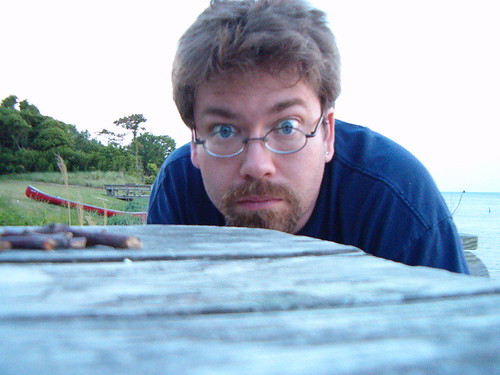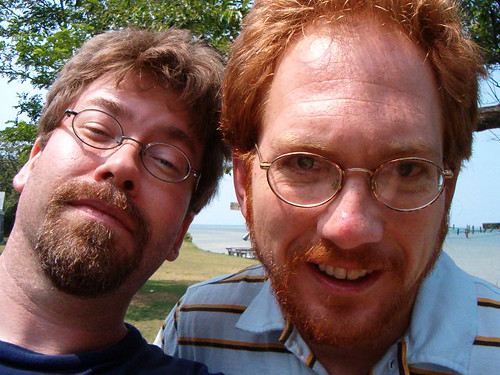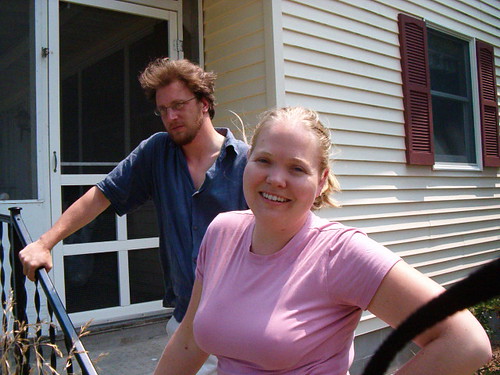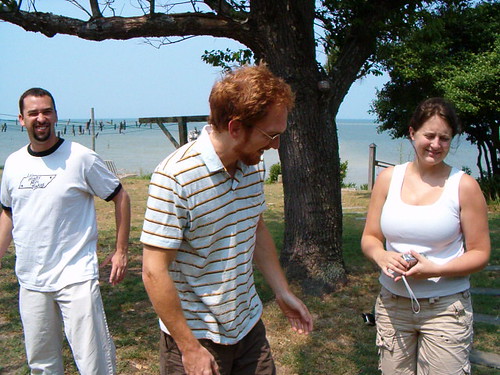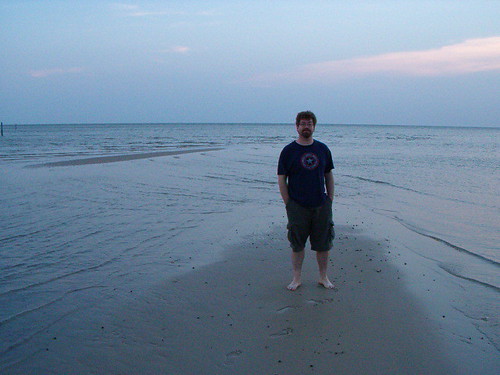So I am like many people in this world in that I have certain irrational fears. Phobias. Yeah.
Phobias, by their very nature, are a bit strange. You get a low-grade anxiety attack from, say,
spiders. Being in
high places makes you woozy.
You can't stand to touch cotton balls. These are all fears that have no basis in anything objectively threatening (at least not threatening in that moment of fear, per se) and yet drive those of us who have them to distraction and avoidance.
Well, yes. I am phobic. I have a set of these fears as well. Most of them are standard issue. I am afraid of heights (and the vertigo can get pretty bad, which made my stint working with
Outward Bound interesting), and I am mildly claustrophobic. I really don't like talking about blood. As abnormal fears go, these are pretty normal, I imagine.
But folks sometimes have a second set of these things - like the cotton example above. I've known two people with that cotton phobia. They can't open aspirin bottles by themselves. Think about it. Some phobias are so common that we don't knock them - the heights one, for example. But when you are afraid of cotton, I imagine sometimes you get some
funny looks.I feel their pain. I, myself, have a peculiar phobia that gets me funny looks and into funny situations.
I'm radiophobic, you see.
No. This is not an irrational fear of lite-rock FM stations (though perhaps there
should be a fear like that) nor of common household appliances descended from Marconi and Tesla's early recievers.
Nope. Radiophobia is an irrational fear of things like
X-ray machines and
nuclear power plants (though irrational here is not meant to mean
ignorant - though that is often a confusion. There is much maligning of "radiophobia" as a knee-jerk antipathy to nuclear things on the part of an uniformed public. That is not what I am talking about. I am talking about a genuine phobia here - a real condition that apparently I share with the likes of
Thomas Alva Edison and many others).
Now it should be noted that there are plenty of reasonable and
rational fears of these things - what with Chernobyl and dirty bomb threats and the like. With reasonable fears you can take reasonable precautions, and minimize risks to safe levels such that normal life can continue, well, you know, normally.
But (and trust me on this one), there is nothing like an
unreasonable fear of X-ray machines to make you aware of just how many unsympathetic dental hygenists there are in the world.
The dialogue ususaly goes something like this:
"Um. I know this might sound crazy, but i'm really uncomfortable sitting here with the X-ray machine turned on. Could it be turned off while I'm here?"
"It's not firing. It won't hurt you."
"I realize it's not firing. I realize it won't hurt me. I'm sorry. It has nothing to do with that. It has everything to do with it being in the room and being turned on. I just have a fear of X-ray machines."
"But it's totally safe," she says, the look of incomprehension starting.
"I have no doubt of that. That actually isn't the point. The point," I say, anxiety building, "
is that I am just... afraid... of it."And as you might expect, this dialogue rapidly goes nowhere, largely for the fact that dental hygenists are, to a fault, a very by-the-numbers sort of population (think about it - you clean teeth every day. These folks have a low need for out-of-routine circumstances). It follows that they would try to reassure me with by-the-numbers rational arguments of safety and the like.
The point is is that this is a phobia, and reasoning with me just does not help. I'm sorry.
Now, before you get the wrong idea - I do not completely collapse in a heap there in the examination room. I do manage to survive with the machine on (they are rarely willing to de-energize it), and I even manage to occasionally get an x-ray done when I am assured that they are absolutely necessary. But it does bring on a low-grade panic attack, and I have just learned to live with that.
The phobia is interesting to observe, though. I think because of it I am more aware (hyper aware) of radiation sources we encounter in our daily lives than the average person. Dentist's offices and airports are obvious. But I notice smoke detectors, and the wicks on gas lamps, and certain areas of the college campus I live near - because I know that each of these is a source of (largely unnoticed) radiaton exposure. And I avoid them. Or, if I can't avoid them, I live with it and just have my blood pressure go up a bit.
What put this in my mind is the fact that, because of this odd phobia of mine, I have an obsessive knowledge of radioactive things. I know way too much about how atom bombs and reactors work. I could probably name off the top of my head at least five dozen
nuclear accidents or contaminations from the last forty years (at least one of which happened near my old home in
Decatur, GA), and I will
never ever go picking up scrap metal (just trust me on this one). And as with
any true paranoid obsession, the combination of the fear and the knowledge means that, for whatever reason, the universe never ceases to delight in having fun with me about this.
So, for example, my first girlfriend, after our first kiss, was talking to me about her family and her life and she was talking about her father and saying he had a weird job and I said, "Well, at least he doesn't work at a nuclear power plant or anything..."
But, in fact,
he did.
And I have in fact had three realtionships with people somehow connected by family to the nuclear industry (all of which I would find out after I got involved with them. it's not like I go looking for this). Needless to say, family visits were not a high point in those affairs.
And so yesterday (this is really what brought it to mind) I was getting my hair cut, and the stylist and I were making conversation. AndI asked how long he had been cutting hair. Not too long. Oh, what did you do before this?
"I was a health physicist in the nuclear industry."
Aha.
So we had a very good conversation, in which I was able to employ some of my obsessive knowledge. I asked about, among other things, whether the
Cherenkov effect is as beautiful in real life as it seems to be in the pictures (it is); whether it is
scary to stand that close to an operating nuclear reactor (it is). He was pleased to realize I knew quite a bit about his job. I was less pleased to realize that, in some ways, I knew just as much about his job as he did, and occasionally more.
"So why are you cutting hair?"
His first answer had a lot to do with changes in the industry, about restructuring and outsourcing and downsizing. And I took that at face value. it wasn't until near the end of the conversation (and the haircut) that I got the rest of the story.
"Thank goodness, " I said, "it sounds like you were pretty safe, and never had any trouble."
"Well, actually, when I was working my last job," he said (and he named the plant, and a part of my brain suddenly went "oops" and I got very quiet), "they were a bit lax, and several of us got exposed to
iodine and
thorium isotopes. So they sent me home for a few months, and then I got the letter about not coming back. I don't like to think about it. I joke sometimes that I probably glow inside, or that I got cancers I don't know about. Though I don't imagine that's really something to joke about."
It's one thing to read about something. It is something else to meet someone who has lived through somehing you have read about. Those are two different things.
So yeah, I have a soft place in my heart for the cotton-phobes of the world, because, like me, they have an irrational fear. And strange phobias are pretty funny. But there are also points when the irrationality of a fear begins to shake hands with the reasonableness of being afraid, and at such moments (I shout from the rooftops to the dental hygenists of the world) I don't imagine it's really something to joke about.
 So anyone who knows me basically knows that I am an absolute, beyond the pale, insanely fanatical follower of any and all things having to do with Superman. If you've met me in person, or been to my apartment, or talked to me for any length of time, this is probably obvious. As obsessions go, it's a gentle and lifelong one. I am no latecomer to this. Keep in mind that, in the months leading up to this, I have gotten a little teary-eyed just watching the movie trailers ("They can be a great people, Kal-El, they wish to be... they only lack the light to show them the way..." Ah, it gets me every time).
So anyone who knows me basically knows that I am an absolute, beyond the pale, insanely fanatical follower of any and all things having to do with Superman. If you've met me in person, or been to my apartment, or talked to me for any length of time, this is probably obvious. As obsessions go, it's a gentle and lifelong one. I am no latecomer to this. Keep in mind that, in the months leading up to this, I have gotten a little teary-eyed just watching the movie trailers ("They can be a great people, Kal-El, they wish to be... they only lack the light to show them the way..." Ah, it gets me every time).